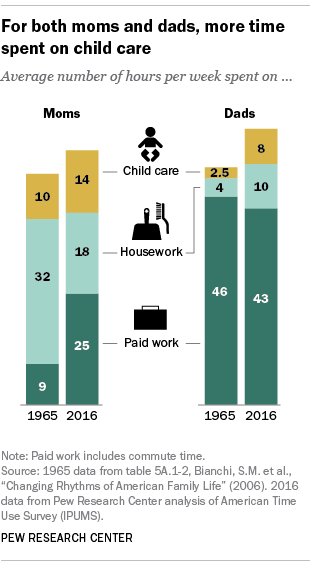Navigating the spectrum of child discipline through the generations
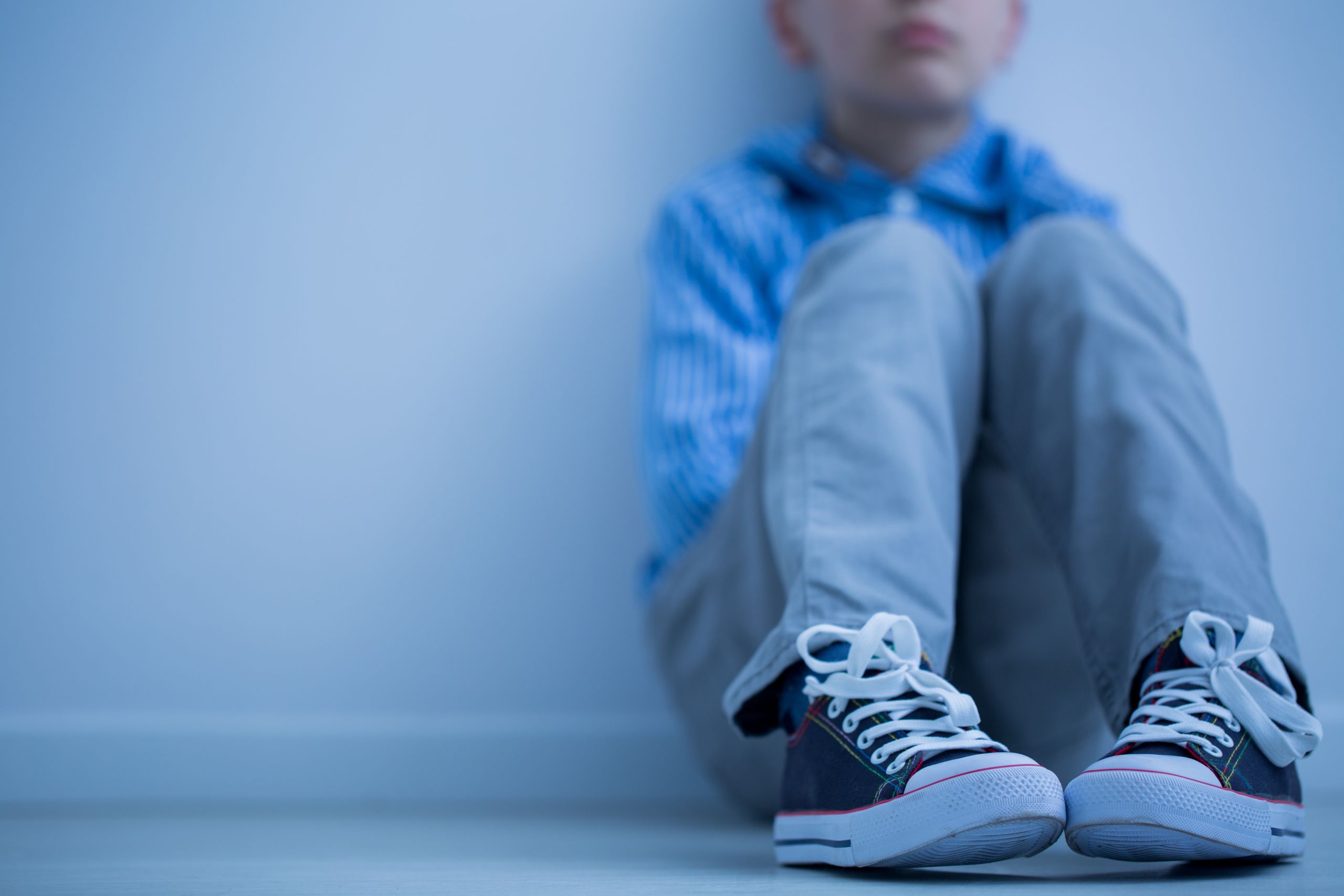
Foreword
Take a look into childrearing like never before. In this project, you will learn the generational story of how parenting styles in America have changed over the course of time through the perspective of history and religion, psychologists, pop culture and music, students, coaches, kids and – of course – parents. This story will reassure you, trigger you and interest you all at the same time.
I reported on this story overlooking the peaks and valleys of the island of Maui. I have certainly had a different childhood than you. Yet, somehow, when I returned to Texas to finish the story, the topic was just as relevant to my peers. I hope you find this project as fun as it was for me to make. And I hope it lingers and makes you question assumptions about child discipline.
JOHN ROSEMOND
A special thanks to highly acclaimed American parenting expert John Rosemond, for contributing original content to this project.
Religion
A NONBELIEVER IN PSYCHOLOGY

1800 -1900
A transition of guiding doctrines (Photo credits: daboostand lkphotographers)
"I believe that if you want to understand human nature, go to the Bible."
From the Christian perspective, the roots of childrearing expertise come from a few lines, and famously, one out of the Old Testament:
"15 The rod and reproof give wisdom: but a child left to himself bringeth his mother to shame" (Proverbs 29:15)
The Bible has a clear position on child discipline.
"15 Folly is bound up in the heart of a child, but the rod of discipline drives it far from him" (Proverbs 22:15)
"The holy experiment" – American colonialization – was predisposed to ideas from the Protestant movement that diverted from the Church of England.
During the Colonial period, Puritans were known to use strict discipline, which they felt would give their children salvation. If disobedient, children were often whipped in public and forced to make public confessions at meetings.
While Christianity and politics often went hand-in-hand in the West, the "New World" was not formed on Christian ideals alone.
A 17th-century English philosopher, John Locke, played a substantial role in manufacturing American ideology1.
Tabula rasa, the Latin term for "blank slate," was one of his well-known theories, as he theorized that children were neither born evil nor predisposed to sin but were born "blank slates," which contested the old and dominant understanding.
“According to the ordinary disciplining of children, [it] would not have mended that temper, nor have brought him to be in love with his book; to take a pleasure in learning, and to desire, as he does, to be taught more, than those about him think fit always to teach him. … We have reason to conclude, that great care is to be had of the forming children’s minds, and giving them that seasoning early, which shall influence their lives always after.” - Locke, "Essay Concerning Human Understanding," 1690
Locke was a Calvinist by faith, and he cited the Bible in his works; however, Locke drew on philosophical ideas that were considered 'liberal' in England and made enemies because of it.
The philosopher died long before he could see his liberal love-child: American society.
Tabula rasa had influenced Anglo-American philosophy. The philosophy was adopted out of an American desire to show other countries their religious independence.
But it wasn't Locke who created liberalism2, just as it wasn't Jesus who facilitated Christianity, nor Friedrich Nietzsche who created Nihilism. Rather, America implored a more tolerant society by choice.
Locke touted the theory that children could be rational and "must be treated as rational creatures," and though it took centuries for the concept to become common thought, in America, it did come.
Amid a desire for societal independence in the 1820s and 30s, a paralleled ideal changed parenting in America: reason over tradition.
"It may give some small light to those, whose concern for their dear little ones makes them so irregularly bold, that they dare venture to consult their own reason, in the education of their children, rather than wholly to rely upon old custom." - Locke, "Thoughts Concerning Education," 1693
Rather than Christian principles of rearing, which preferred corporal punishment, American laissez-faire appealed to the idea that children could be reasoned.
This was an era in which there was a "gentling of attitudes" toward children, wrote novelist Mary Cable in her book, "The Little Darlings: A History of Child Rearing in America."
For these parents, the fewer adult responsibilities the child had, the better off he or she would be because they would not be missing childhood. Instead of using harsh discipline, the idea that children could be reasoned with became accepted by some, said author Bernard Wishy in his book "The Child and The Republic."
Nonetheless, many parents still continued to whip their children late into the 1800s because the majority believed it to be more effective than other methods.
And rigid approaches to childrearing pressed on into the early 1900s.
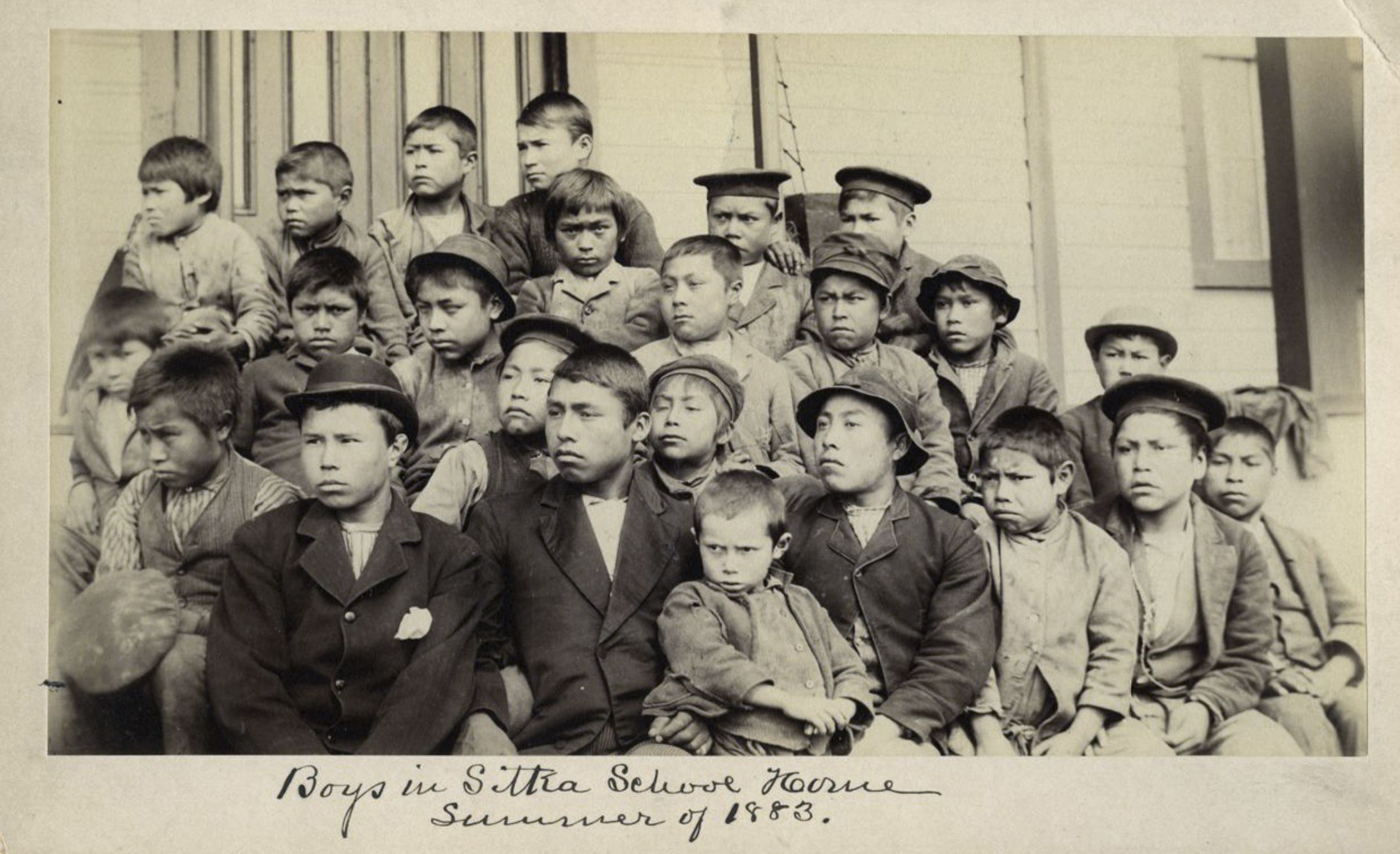
FILE - This photo made available by the Presbyterian Historical Society, Philadelphia shows students at a Presbyterian boarding school in Sitka, Alaska in the summer of 1883. U.S. Catholic and Protestant denominations operated more than 150 boarding schools between the 19th and 20th centuries. Native American and Alaskan Native children were regularly severed from their tribal families, customs, language and religion and brought to the schools in a push to assimilate and Christianize them. (Presbyterian Historical Society, Philadelphia via AP, File)
FILE - This photo made available by the Presbyterian Historical Society, Philadelphia shows students at a Presbyterian boarding school in Sitka, Alaska in the summer of 1883. U.S. Catholic and Protestant denominations operated more than 150 boarding schools between the 19th and 20th centuries. Native American and Alaskan Native children were regularly severed from their tribal families, customs, language and religion and brought to the schools in a push to assimilate and Christianize them. (Presbyterian Historical Society, Philadelphia via AP, File)
1900 - Present
In 1946, an American psychologist named Benjamin Spock took a different stance than most of the popular, stringent parenting books of the time. His stance on rearing involved scheduling and planning out discipline to achieve the end goal of a well-suited individual.
Spock wrote his own book, "The Common Sense of Baby and Child Care," which became one of the best-selling books of the century.
The book received both extreme praise and extreme criticism. It was heavily criticized for promoting a permissive style of parenting that many Americans weren't accustomed to.
Spock intended to account for the emotional implications of discipline, though it was easily disagreeable for many because his hypotheses were based on a psychoanalytical background3.
“Children are driven from within themselves to grow, explore, experience, learn and build relationships with other people,” the latest edition of "Baby and Child Care" reads. “So while you are trusting yourself, remember also to trust your child.”
To say that his work changed parenting in the United States would be an understatement, but a majority opposition remained.
Experts like John Rosemond maintain an 'old school' theory of child discipline that finds itself rooted in Christianity.
"Obedience has to be forced because you're pushing through one's nature," Rosemond said.
The 'old school' and 'new school' perspectives today are at odds, as they were in the 1950s: Regimented versus open, forced versus natural, authoritative versus permissive.
1. Thomas Jefferson's 'Life, Liberty and Pursuit of Happiness closely aligns with Locke's "Life, Liberty and Property."
2. "All mankind [...] being all equal and independent, no one ought to harm another in his life, health, liberty, or possessions." (John Locke, Second Treatise of Government)
3. Benjamin Spock interned at Presbyterian Hospital where he gained an interest in how the well-being of patients related to their emotional makeup. His interest increased because most questions asked by parents related to psychological issues. This information led Spock to believe that pediatric doctors should be trained in psychology as well. As a result, Spock engrossed himself in Sigmund Freud's theories about children and parenting. He believed Freud's ideas regarding affectionate child-rearing were healthier than the harsh style of parenting used by his own parents. (Study.com)
Behavior
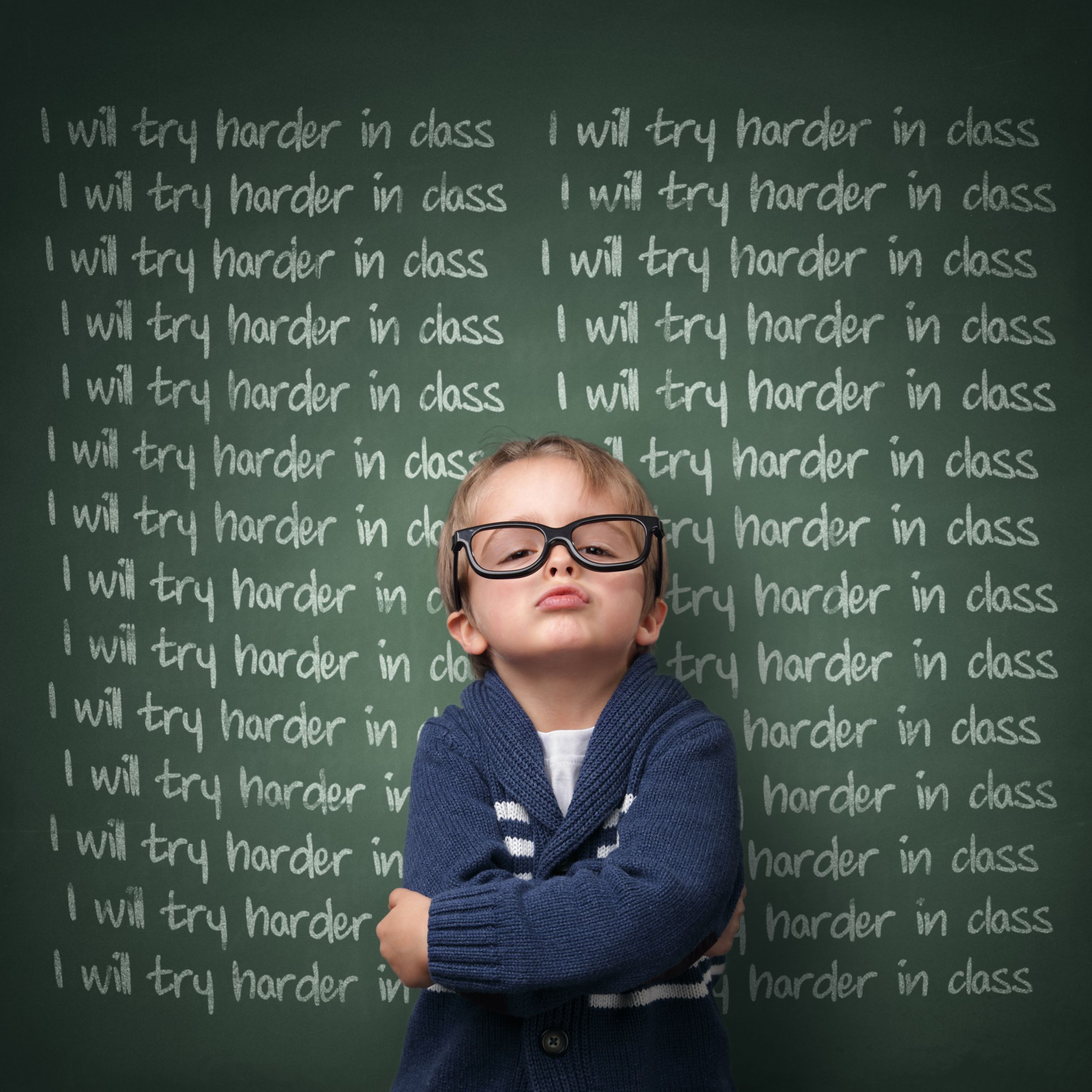
"Psychology consists of a set of theories concerning human nature and the big three schools in that regard, humanism, behaviorism and Freudianism. Interestingly enough, these three schools of philosophy are still taught in America's graduate schools as if they are true, when every study done by objective people has found that they are false."
Conflicting messages of parenting styles became even more convoluted in the 20th century with the emergence of psychology.
"With the beginning of the 1900s, childrearing experts proposed new methods of "pressuring children into good behavior," said Cable.
Some may remember a time from early schooling when teachers would flip a color card for bad behavior. That's an example of behaviorism1 in practice. It's about giving punishments and rewards for every "learning moment," and it's still used today.
Casey Call, a professor of professional practice at the Karyn Purvis Institute of Child Development, also challenges behaviorism, highlighting its common use.
"When I was a teacher, the discipline practices were really behavioral. We would do things like keeping behavioral charts. I also worked at an inpatient psychiatric unit, and we used a behavioral chart," said Call.
What Call found was that the children who had had their cards changed to yellow and red as punishment almost never changed their behavior.
"It's the same kids getting in trouble over and over and over again," she said. "What we're doing is we're shaming them by having them go up to the front of the room and move their color or putting their name on the board [...] They're not learning what you want them to do."
One thing Rosemond and Call have agreed on is that the way behaviorism has been used in childrearing has not shown positive results.
To Rosemond, the proverbial 'fly in the ointment' is that most children are not reasonable creatures.
"You know, behavior modification does not work reliably with human beings," he said. "Because of the way we are constituted, [...] we don't come out of the womb of blank slates, we already have programming, and that programming involves free will," he said.
1. "Behavioral psychology, or behaviorism, is a theory suggesting that environment shapes human behavior. In a most basic sense, behavioral psychology is the study and analysis of observable behavior. This field of psychology influenced thought heavily throughout the middle of the 20th century" (Rivier University).

emotional intelligence (EQ) word cloud on a napkin with a cup of coffee. (iStock.com/marekuliasz)
emotional intelligence (EQ) word cloud on a napkin with a cup of coffee. (iStock.com/marekuliasz)
A brick in the wall

In 1977, the U.S. Supreme court ruled in its Ingraham v. Wright decision that corporal punishment in schools is constitutional.
Two years later, in 1979, Pink Floyd released its social commentary concept album, "The Wall."
Every generation has its storytellers. For Gen Z, Kendrick Lamar's Good Kid, M.A.A.D. City was one of many hip-hop records that reached millions and impacted the political, pop-culture and social environment of the next generation — especially with the rise of social media.
Storytelling like Lamar's in radio music had a short history before Floyd's concept album, "The Wall."
In Floyd's "The Wall," the band eclipses some of the problems of a generation, touching on the mental and physical abuse of children.
"Another brick in the wall" is the central concept. A "brick" is added to the "wall" when their semi-fictional1 character, "Pink," has a traumatic experience that debilitates his emotional state. The portrayal of discipline as detrimental to one's mental health development is a major theme early in the album.
Brainchild of "The Wall" Roger Waters was part of the same generation that experienced corporal punishment in schools before it was viewed as a step too far, not to say the concept has been abandoned (it's legal in public schools, pre-K through 12th grade, across 19 U.S. states).
For Waters, it wasn't all a made-up story (or album for that matter).
"When we grew up and went to school
There were certain teachers who would
Hurt the children in any way they could
By pouring their derision
Upon anything we did
And exposing every weakness"
In a radio interview, Waters said the purpose of his schoolteachers was "to keep [their students] quiet and still, and crush them into the right shape so that they would go on to university and 'do well'."
"We don't need no education"... you know that song?
Targeting teachers' abuse of discipline, both physical and mental, Waters highlights what many modern childrearing experts believe: there is a thin line between taking out anger and disciplining a child.
"He [Water's teacher] was a really crushed person and he handed as much of that pain onto us as he could — and he did quite a good job of it," Waters said in a radio interview.
"No dark sarcasm in the classroom
Teachers leave them kids alone
Hey! Teachers! Leave them kids alone!
All in all it's just another brick in the wall."
"He seems like a kind of a grumbler to me," said Rosemond. "He grumbles about one of his high school teachers — secondary school in England, I guess they call it — and, you know, there is a likelihood that Roger Waters was a jerk."
Whether historical exaggeration or accuracy, this narrative has been accompanied by the current mental health community who accuse discipline of causing permanent psychological damage.
Of course, those once-taboo themes can be found in almost any popular album nowadays because it's more important to younger generations.
For one, mental health awareness has grown, as Generation Z is more likely to receive treatment (37%) than the Silent Generation (15%), according to a report released by the American Psychiatric Association.
Mental health experts have found sufficient proof that parenting affects brain structure.
"In more recent years, there have been a lot of neuroscience and neuroimaging that has kind of has gone to support what we've been seeing in behavior," said Call.
Call cited Dr. Bruce Perry, the senior fellow of the Child Trauma Academy in Houston, Texas, who published a book with philanthropist Oprah Winfrey on coping with disruptions in brain development since birth in 2021.
According to Call, Perry was the first to show an FMRI image of a child who had been severely neglected versus a child who had been nurtured.
"He showed the difference between their brains. And it is remarkable," she said. "You can see the child who has been neglected has a smaller brain. They have larger ventricles, which means they don't have as much gray and white matter. Their corpus callosum, which helps both sides of the brain communicate, is less developed. They have it's smaller in size. They have just all these different changes. And so I think we also not only do we have the longitudinal data to support it, but now we have kind of the biological data to support it as well."
Despite advice from national pediatric and psychological leaders, corporal punishment in public schooling has remained federally constitutional - it's all about how states define "cruel and unusual punishment."
Needless to say, it's still difficult for many Americans to remove a brick from the wall when that particular brick is a cornerstone.
"Beating them, and all other sorts of slavish and corporal punishments, are not the discipline fit to be used in the education of those we would have wise, good and ingenious men; and therefore very rarely to be applied, and that only in great occasions, and cases of extremity. On the other side, to flatter children by rewards of things that are pleasant to them, is as carefully to be avoided"
1. The album’s central story was semi-autobiographical, based on Roger Waters and former band member Syd Barrett. The motif of walls symbolized the defense mechanisms Waters had built up against those who might hurt him: parents, teachers, wives and lovers.

Childish: discipline in the age of Gen Z podcast

This podcast features child development experts from three generations, Casey Call, John Rosemond and Dr. Alex Avila, in a set of divisive interviews on child discipline in the age of Gen Z. It also features some music I produced.
A new generation
About 13% of the world's children are fully protected by law from all corporal punishment, according to the Global Partnership to End Violence Against Children.
It's become clear that the vision for child discipline worldwide remains in contention in the United States.
The only membered country in the U.N. that is not a party to the United Nations Convention on the Rights of the Child (CRC)1 is the United States.
The fear of the CRC is that the government could have "unlimited interference in family life," stated Atlas Corps, an international nonprofit. Atlas added that the positives would mean empowering children's rights and protections and increasing the competencies of parents to bring up their children.
Perhaps the new generation of parents and soon-to-be parents have a more unified stance than previous generations with science and the mental health community having a larger influence.
CNN put out an article on June 28, 2021, titled "Spanking can worsen a child's behavior and do real harm, study finds," that reviewed the mixed results of 13 out of 19 independent studies on whether spanking and other forms of child punishment created external behavioral problems over time.
The article cited one study that found that children who were punished gained "fewer cognitive skills" than those who were not physically punished.
According to a Monitoring the Future study, spanking has declined in the United States from 50% to 35% between 1993 and 2017. The analysis surveyed high school seniors in 1993 and surveyed those with children again in 2017.
The American Academy of Pediatrics has recommended alternatives to parents and guardians spanking children in early youth.
"Parents should distract, by giving them other things to do that are less disruptive or picking them up and moving them to a different place. That's all they can do," Dr. Robert Sege of the American Academy of Pediatrics said in a CNN interview.
1. "The Convention on the Rights of the Child is the most comprehensive instrument, which protects children’s civil, political, as well as social, health, economic and cultural rights. It is built on the idea of child’s best interests and welfare, as well as protects children against all forms of discrimination" (Atlas Corps)
Parents or kids?
"Parents, being wisely ordained by nature to love their children are very apt, if reason watch that natural affection very warily, are apt, I say, to let it run into fondness"
The term "helicopter parent" was coined in 1990 to describe parents who constantly rescued their children from conflict.
This is equated to parents protecting their children from conflict at all costs, taking permissive parenting to new heights.
A mystery seems to be why it's happening now.
"The kind of home life, the typical home life was, say, in the 1950s, mostly stay-at-home parent and a working parent. Kids had a lot of autonomy," Call said. "Parents didn't micromanage. There wasn't 'helicopter parenting'. Society has changed, parents have gotten more involved in their children's lives."
Call also said she thinks "our view of children has changed."
Why?
Rosemond says it has to do with self-esteem.
"This idea that Gen Z needs different discipline would presume that Gen Z is a different species," said Rosemond. "It comes back to this attempt on the part of parents over the last 50 years at the behest and encouragement of the mental health professional community in America to instill high self-esteem into their children."
A Brigham Young University study from 2012 revealed that "helicopter parenting" induced negative effects, including lowering self-worth and higher risk behavior, such as binge drinking.
Rosemond continued, "My parents when I had an outburst of high self-esteem, told me that I was acting too big for my britches. When I had an outburst of high self-esteem [they] told me I'd better get down off my high horse. The parents don't talk to children like this anymore because modesty and humility are no longer the ideals. And because modesty and humility are no longer the ideals, bullying has taken off like an intercontinental rocket. So what you have done, what we've done to your question is we have substituted in the home and in the school a leadership model of childrearing and teaching. We have substituted for that model a relationship model."
A relationship model. Sheltering children. Helicopter parents. It's divisive. It's generational.
On one hand and on the other, Gen Z is deliberating both.
With varying religious beliefs, contradicting philosophies, books, personal anecdotes and mixed scientific studies, the question remains: How will and should Gen Z rear their children?
It is possibly the most important story that has yet to be written, but Gen Z is starting to find its path to rearing, just as every generation has.
Time will tell.
And yet.
That time is also now.
Fredrick Douglass once said, "It is easier to build strong children than to repair broken men."

Portrait of beaming bearded man having fun with laughing little boy. He keeping him on back during game on air-stop. They situating opposite rotor plane. (iStock.com/YakobchukOlena)
Portrait of beaming bearded man having fun with laughing little boy. He keeping him on back during game on air-stop. They situating opposite rotor plane. (iStock.com/YakobchukOlena)
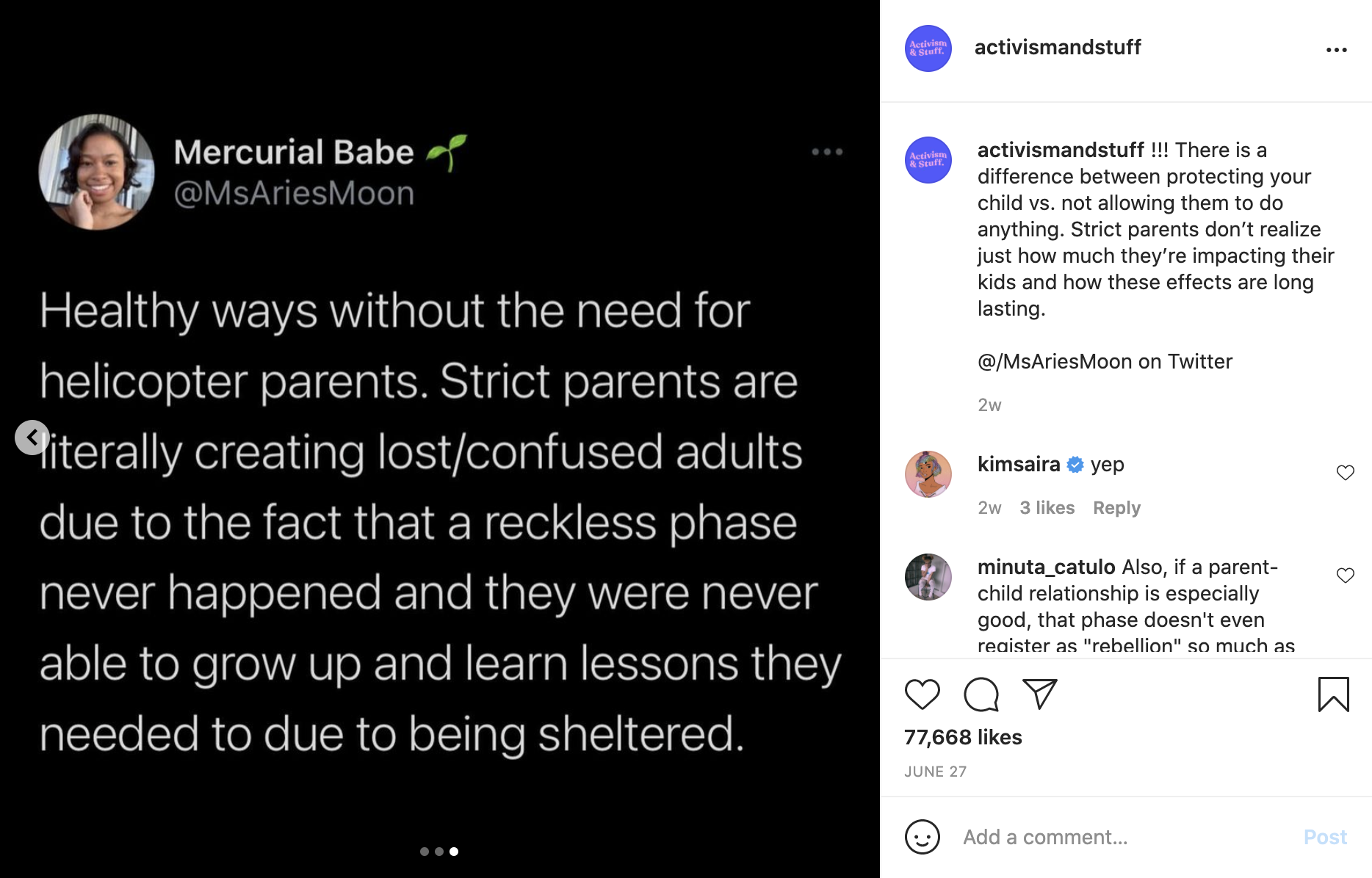
(Courtesy: @MsAriesMoon)
(Courtesy: @MsAriesMoon)
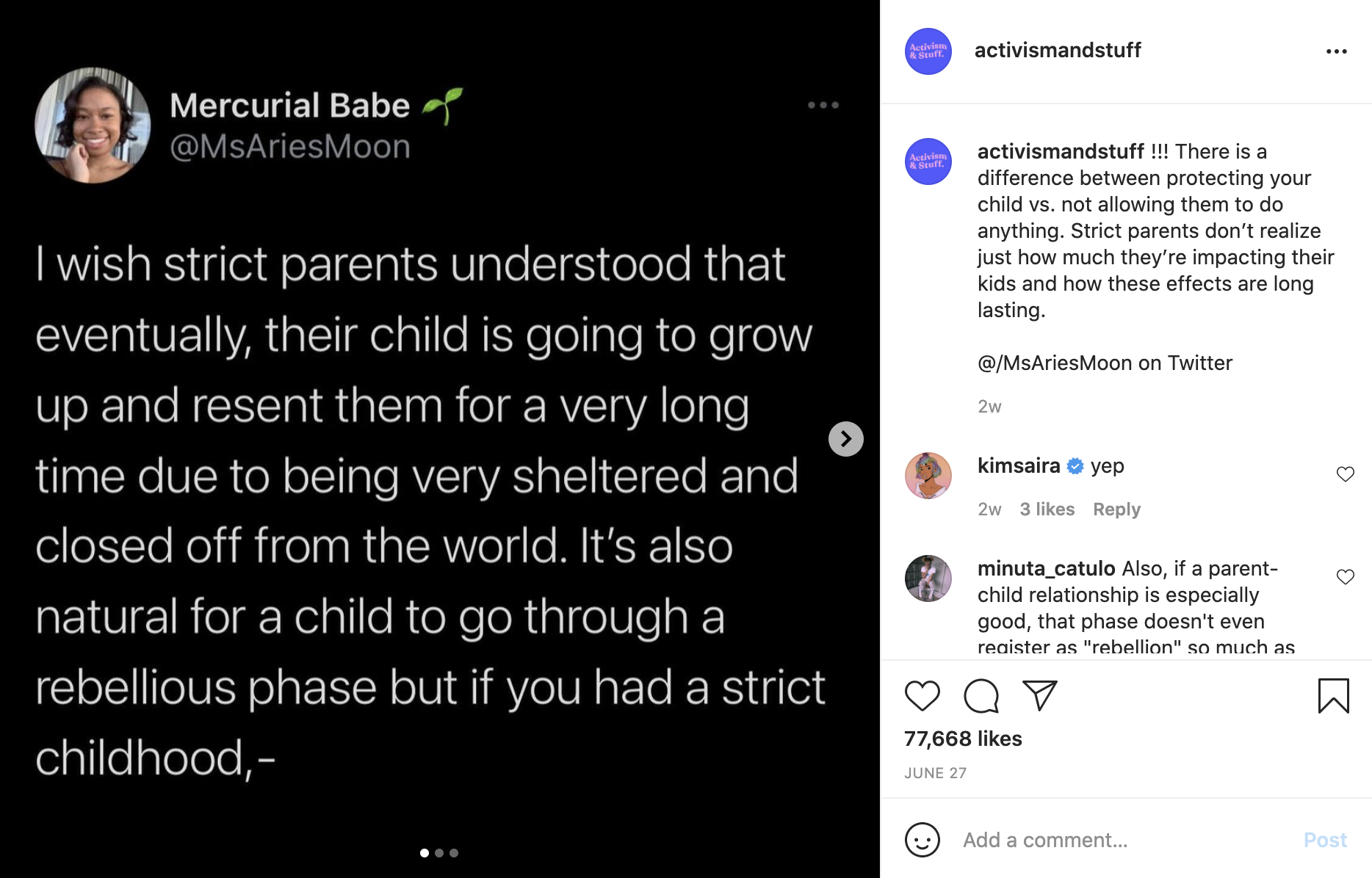
(Courtesy: @MsAriesMoon)
(Courtesy: @MsAriesMoon)
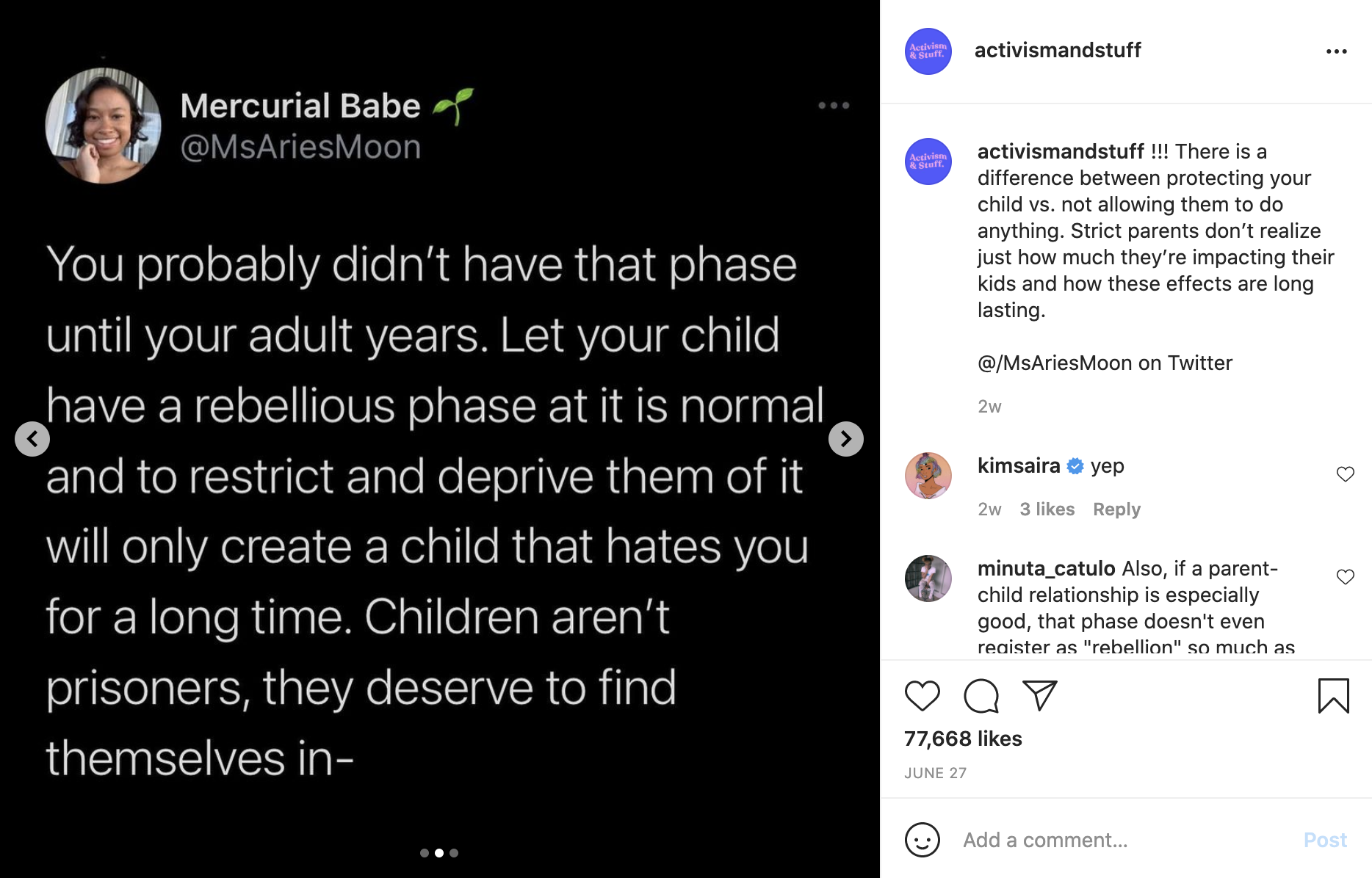
(Courtesy: @MsAriesMoon)
(Courtesy: @MsAriesMoon)
Below are individual anecdotes collected from baby boomers, teachers and coaches regarding how they view discipline and its changes:
This project is dedicated to my loving father.
This story is one in a series about how Generation Z functions, interacts and incites change in today's world.
Read the next story to explore more about how Gen Z thinks about the world’s issues including discipline, diversity and inclusivity.


